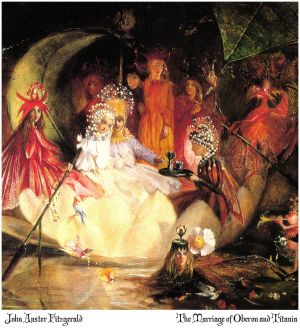Oberon, also Auberon, King of the fairy, is most famous as a character in William Shakespeare's play, A Midsummer Night's Dream, written in the mid-1590s. Oberon gives his wife, Titania, a potion that causes her to fall in love with Bottom in order to get the changeling.
History/Beliefs
The medieval concept of the character Oberon arose from a multitude of earlier sources.
Merovingian legend
Oberon's status as king of elves comes from the character of Alberich (elbe "elves" reix, rex "king"), a sorcerer in the legendary history of the Merovingian dynasty. In the legend, he is the otherworldly "brother" of Merowig, whose name is the eponym of the Merovingians. Alberich wins for his eldest son Walbert the hand of a princess of Constantinople. In the Nibelungenlied, a burgundian poem written around the turn of the 13th century, Alberich guards the treasure of the Nibelungen, but is overcome by Sigfrid.
French heroic song
The name Oberon got its literary start in the first half of the 13th century from the fairy dwarf Oberon that helps the hero in the chanson de geste, titled Les Prouesses et faitz du noble Huon de Bordeaux. In the song, the noble Huon, son of Seguin count of Bordeaux, kills a man who lay in ambush for him, who turns out to be Charlot, the Holy Roman Emperor. Huon is condemned but wins a reprieve on the condition that he visits the court of the amir of Babylon, kisses the amir's daughter Esclarmonde three times, slays the greatest of the amir's knights, and brings back a hank of the amir's hair and four of his back teeth. By the help of Auberon, Huon succeeds, though he meets with many adventurous episodes along the way.
The real Seguin was count of Bordeaux under Louis the Pious in 839, and died fighting against the Normans in 845. Charles l'Enfant, a son of Charles the Bald, died in 866 of wounds inflicted by a certain Aubouin in the circumstances of an ambush similar to the Charlot of the story.
Thus Oberon appears in a 13th century French courtly fantasy that is based on a shred of 9th century fact. He is given some Celtic trappings, such as a magical cup (similar to the Holy Grail) that is ever-full for the virtuous: "The magic cup supplied their evening meal; for such was its virtue that it afforded not only wine, but more solid fare when desired" according to Thomas Bulfinch. In this story he is said to be the child of Morgan le Fay and Julius Caesar.
A manuscript of the romance in the city of Turin contains a prologue to the story of Huon de Bordeaux in the shape of a separate romance of Auberon, and four sequels, and there are later French versions as well.
Shakespeare saw or heard of the French heroic song, through the ca 1540 translation of John Bourchier, Lord Berners, called Huon of Burdeuxe. In Philip Henslowe's diary there is a note of a performance of a play, Hewen of Burdocize, on December 28, 1593.
Art/Fiction
Other historical references
In 1610, Ben Jonson wrote a masque of Oberon, the Fairy Prince. It was performed by Henry Frederick Stuart, the Prince of Wales, at the English court on New Year's Day, 1611.
In 1826, Carl Maria von Weber's opera, Oberon, or the Elf-King's Oath (written after a poem by Christoph Martin Wieland) debuted at Royal Opera House|Covent Garden in London.
In the four operas of 1854 to 1874 by Richard Wagner, Der Ring des Nibelungen|The Ring of the Nibelung, his role evolves in the opposite direction and he winds up stealing the Das Rheingold|Rhinemaidens' gold.
Modern references
- In 2000, the series Lexx portrayed Oberon in the episode 4.11: A Midsummer's Nightmare.
- Oberon was also a guest character in an episode of Pokey the Penguin.
- In The Chronicles of Amber by Roger Zelazny, Oberon is the King of Amber and the father of all of the princes in the series
- In the middle-grade novel The Revenge of the Shadow King, by Derek Benz and J.S. Lewis, Oberon appears in the title role of the all-powerful and malevolent king of the Land of Faerie.
- References to Oberon & Titania appear as two of the mortal names given to the King and Queen of Faerie in Raymond E. Feist's 1988 fantasy novel, Faerie Tale.
- Oberon was a character appearing in Walt Disney Television Animation|Disney's Gargoyles (animated series)|Gargoyles as the ruler of the mystical Avalon and "king" of the Oberon's Third Race. Also seen in Gargoyles is the Shakespearean trickster Puck
- Oberon has appeared in the comic books The Sandman, Hellboy, and The Books of Magic.
- Oberon, along with his wife Titania, appears in the Nickelodeon show Fairly OddParents
- Oberon appears in Nickelodeon Fairly OddParents video games
- The sword Firebrand in the video game Castlevania:Symphony of the Night's information is 'Fire sword of Oberon'
- Oberon has also appeared in the novel Magic Street by Orson Scott Card.
- In David A McIntee's 1999 Doctor Who novel Autumn Mist, Oberon, the King of the fairie-like Sidhe, takes his name from the Shakespearean character
- In the Playstation 2 title Shin Megami Tensei III: Nocturne by Atlus, one of the attainable demons is Oberon. The game states that his wife is Titania, and a curse set upon him at childhood has stunted his growth.
- Kalamazoo Brewing Company (Bell's Brewery, Inc.)'s most popular brew,an American wheat ale, is named Oberon.
- King Auberon Quin is the elven monarch of London in G. K. Chesterton's novel, "The Napoleon of Notting Hill" (1904)
External link
- Encyclopaedia Britannica 1911: "Huon de Bordeaux" "Oberon"
Thomas Bulfinch, Age of Fable vol. IV retells the chanson of Huon de Bordeaux

